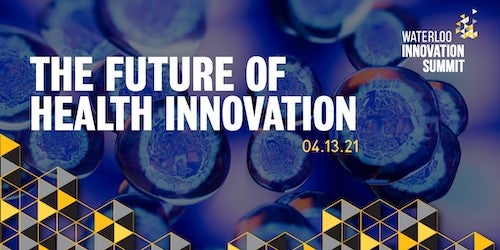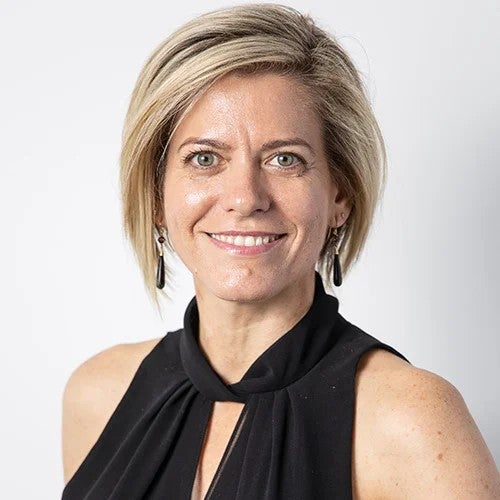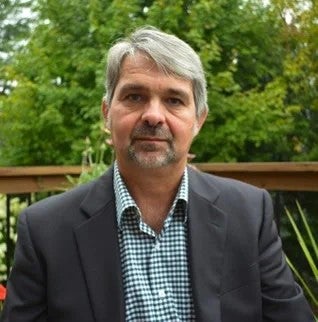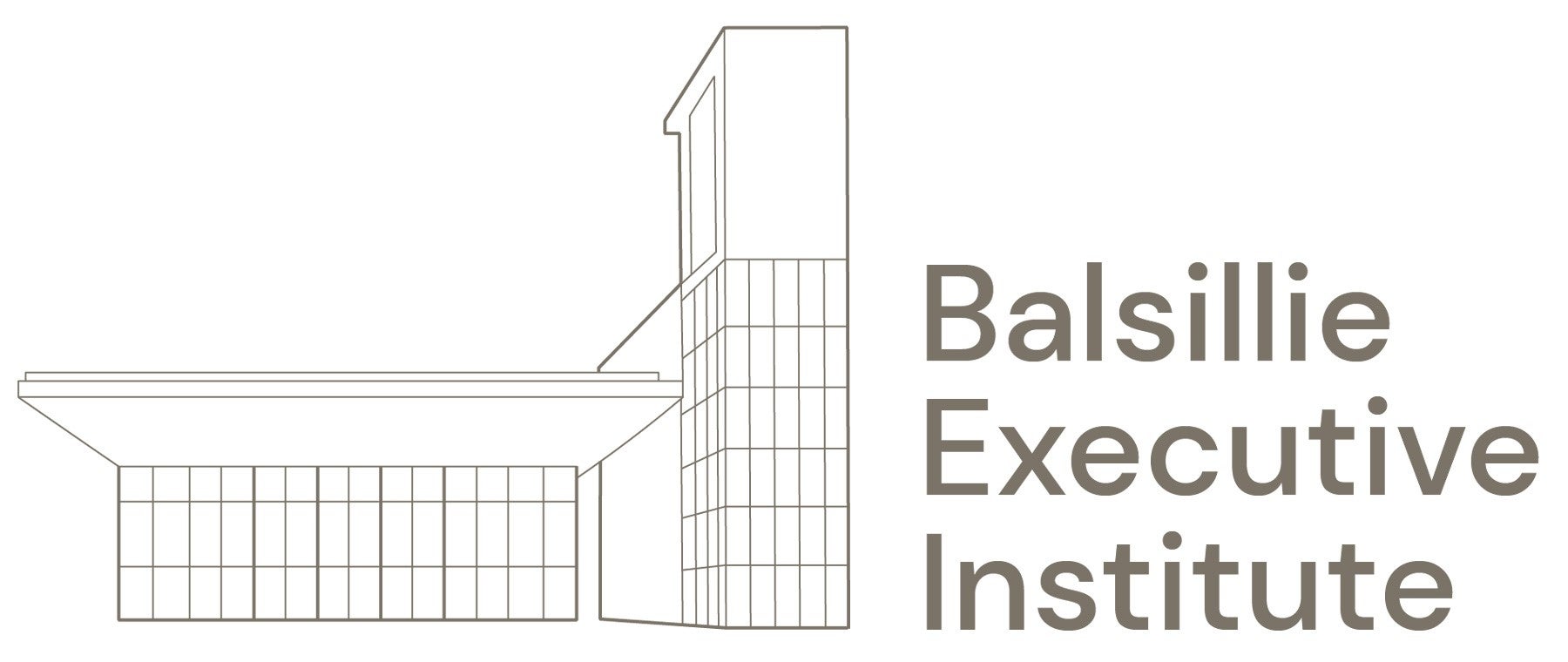Editor:
Brandon Sweet
University Communications
bulletin@uwaterloo.ca
Waterloo Innovation Summit looks to the future of health

Global and individual health has been disrupted over this past year’s pandemic. Looking forward, it will take technology breakthroughs and inspired entrepreneurs, connected in a diverse ecosystem, to infuse innovation into global health systems and solutions. Waterloo entrepreneurs and researchers are advancing health innovation — whether it is engineers developing biomedical devices, mathematicians advancing biostatistics, or social scientists advising global health policies.
Today, the Waterloo Innovation Summit will explore how the new Innovation Arena is poised to be a catalyst for breakthroughs in health technology and innovation, and an epicentre for new and growing companies here at home and globally. Nearly 500 people have registered to attend the virtual event, which runs from 9:00 a.m. to 10:00 a.m.

Delivering the keynote address, "Digital disruption in the health sector," via pre-recorded video will be Dr. Louise Schaper, chief executive officer of the Australiasian Institute for Digital Health. Dr. Schaper is an innovator and change agent leading the conversation on how technology is changing health care.
Following the keynote address, Dean of Health Lili Liu will engage Dr. Schaper in a fireside conversation.
The event also features a panel discussion entitled "Health Innovation and our post-COVID Recovery." As we look to recover our global health systems and economies devastated by the pandemic, investing in health innovation will be a spark that ignites our recovery. The panel will discuss how to create the pathways to streamline commercialization, open doorways to global markets and stimulate economic development.
The panel will be moderated by Executive Director of Velocity Adrien Côté and will feature panelists Jun Axup, chief science officer and partner, Indie Bio, Catherine Burns, executive director of health initiatives and sponsored research at the University of Waterloo, and Brian Lewis, president and CEO, Medtech Canada.
The Summit proceedings will be recorded and uploaded to waterlooinnovationsummit.com after the event.
For more information on how to register, visit the Waterloo Innovation Summit website.
Campus Wellness director to retire in June

Director of Campus Wellness Dr. Walter Mittelstaedt will be retiring from the University on June 30, 2021.
“I share this news with mixed emotions as Walter has made significant contributions to the University during this time,” wrote Chris Read, associate provost, students in a memo circulated to Campus Wellness last week.
“Walter has many strong ties to our campus community, and has served as the Campus Wellness Director since 2014,” Read writes. “Walter has played a leading role in the growth and development of an integrated approach to student wellness. Our programs and services have evolved to be some of the most expansive in the country, and the launch of a formal Health Promotion program further sharpened the strategic direction for campus.”
Mittelstaedt is a Waterloo alumnus and has graduate degrees in clinical psychology from the University of Saskatchewan. Prior to becoming Director, Campus Wellness in 2014, he was the Director of the Centre for Mental Health Research and Treatment (CMHRT) in the University of Waterloo’s Department of Psychology beginning in 2008. From 1991 to 2008, Mittelstaedt was involved in senior management positions at Lutherwood Children’s Mental Health Services.
“He has provided the University tremendous steady leadership and guidance in virtually every aspect of university life,” Read continues. “I’d like to highlight his invaluable contributions to our campus community as we navigate the pandemic, as well as all the work on PAC-SMH followed by the implementation with CoSMH.”
“On behalf of all of us, I would like to express my gratitude to Walter for his leadership, commitment and dedication to the University of Waterloo and wish him all the very best,” Read concludes.
A succession plan for Dr. Mittelstaedt’s role is currently underway.
BSIA launches Balsillie Executive Institute

The Balsillie School of International Affairs has launched the Balsillie Executive Institute (BEI), which will offer certificate-based professional development courses focused on international public policy and global governance.
“In the fluid and ever-changing international policy environment, junior officers, mid-careerists and strategic policy leaders will now have access to opportunities to enhance skills and remain abreast of current sector-relevant thinking without a commitment to full-time education,” said Professor Ann Fitz-Gerald, director of the Balsillie School of International Affairs, and instructor at the BEI.
All BEI short courses are taught via Zoom by globally renowned experts in their fields. The courses are typically four days in duration, and will feature activities including interactive plenary discussions, simulations, break-out group work and reflective exercises, as well as guest speakers.
“These courses cater to current-day demands on both work and personal schedules,” said Olaf Weber, BEI instructor and Professor at the University of Waterloo. “The BEI’s courses support career-focused objectives across various specialized areas within the wider realms of international public policy and global governance.”
The first two courses will be offered in June 2021. “Strategic Policy Leadership” will be taught by Dr. Ann Fitz-Gerald, and will address all critical aspects of a resilient organization from problem solving, strategic planning, data analytics and evidence-based policy analysis, direction setting, and policy implementation. “Strategies for Good: Innovation in the Public Sector” will be co-taught by Dr. Colleen Loomis and Dr. Carrie Wright, and will feature teachings on the full innovation cycle – from establishing the innovation mindset and nurturing innovation teams, to managing perceptions of risk and communicating effectively with decision-makers and stakeholders.
Upcoming courses cover topics including Gender-Responsive Governance, International Sports Governance, and Sustainable Finance. Registration is now open on the BEI’s website www.balsillieinstitute.ca.
The origin of water on planets in our universe

By Elizabeth Kleisath. This article was originally featured on Waterloo News.
Water is essential for life as we know it – water makes up around 70 per cent of the human body, covers about 70 per cent of the planet Earth, has been found in the far reaches of our universe, and is at the centre of our search for habitable planets around other stars.

But how does this water find its way from interstellar space to the comets and planets it is found on? This was one of the questions that Professor Michel Fich from the Faculty of Science, and his international colleagues set out to research, using observations from the Herschel Space Observatory.
Measuring infrared light waves from its orbit around the Earth, this telescope had a unique eye on the stars, away from the water vapour in the Earth’s atmosphere. This let the telescope search the infrared wavelengths for signs of water in the far reaches of our universe.
Five years and over 100 academic papers later, this international group of researchers has published a summary and new analysis of their findings in the paper Water in star-forming regions: Physics and chemistry from clouds to disks as probed by Herschel spectroscopy.
“This paper paints the most complete picture ever done of how water is formed in space, and ultimately ends up in planets,” says Fich. “It’s very exciting to see the work of so many people around the world brought together in one place.”
Every molecule has a unique “fingerprint”, known as a spectrum, that can be studied and traced under different wavelengths of light. By identifying, isolating, and measuring the various spectra of water in its different molecular forms and at different temperatures, Fich and the other researchers were able to piece together the movement of water molecules in regions of space where stars and planets are still forming.
Most of these water molecules are formed in dense molecular clouds between the starry regions of space, also known as star-forming regions. Once these clouds get massive enough, they collapse from gravity and create dense balls of gas, forming stars.
During star formation, most of the hot water vapour is lost to space, due to an outward flow of gas coming from the forming star. This leaves the cool water molecules – liquid and ice still present in these regions. Most of the water molecules are ice, crystallized in layers around particles of dust. These icy dust crystals grow to be about the size of small pebbles, and are used as some of the building blocks as the leftover materials begin to gather together to create planets and solar systems around the newly formed stars.
Through this research, the international team has concluded that new planetary systems likely have enough water to become habitable – enough water to fill several thousand oceans!
Professor Fich, alongside his most recent graduate student Mollie Conrad (BSc ’16, MSc ’19), contributed to this international effort by studying the star forming region NGC 7129, located 3000 light years away from Earth.
“By studying this region, we were able to show that the high energy spectral lines of water that contained heavier-than typical atoms of oxygen have the highest potential for successfully probing the water in star forming regions like this one,” says Fich.
The overall findings of this international research are expected to be an important resource for astronomers in the decades to come, as scientists continue to study the origins of water on potentially habitable planets in distant solar systems.
ink of the day
When and Where to get support
Students can visit the Student Success Office online for supports including academic development, international student resources, leadership development, exchange and study abroad, and opportunities to get involved.
Instructors can visit the Keep Learning website to get support on adapting their teaching and learning plans for an online environment.
Updated Course templates are now available within your course in LEARN to help you build and edit your content and assignment pages quickly.
The following workshops, webinars, and events are offered by the KL team (CTE, CEL, ITMS, LIB):
Independent Remote Course Design Essentials. Self-directed, continuous self-enrollment course in LEARN.
NEW - LEARN for TAs (CTE6550), Wednesday, May 5, 10:00 a.m. to 11:30 a.m.
Employees can access resources to help them work remotely, including managing University records and privacy of personal information. Here are some tips for staying healthy while working from home.
Stay informed about COVID cases on campus by consulting the COVID case tracker.
Whether you’re a student or faculty member, the Writing and Communication Centrehas virtual services and programs to help you with all of your academic writing needs. This term we have added evening and weekend one-to-one appointments with our peer tutors, and our NEW one-to-one workshops, where you can learn the content directly from one of our writing advisors.
- Undergraduates: Work with us to brainstorm, draft, revise, and polish your assignments in one-to-one appointments. Ask questions and learn writing tips at our Instagram Live Q&A sessions, and beat isolation while improving your writing skills at the weekly PJ-friendly writing groups.
- Graduates: Meet with our advisors in one-to-one appointments. Join the online writing community at the Virtual Writing Cafés, learn how to present your work at Speak Like a Scholar, or get moving on your dissertation at Dissertation Boot Camp.
- Faculty and Instructors: Request custom workshops for your courses, join the Waterloo writing community at the Virtual Writing Cafés, or make progress on your article, book, or chapter in one-to-one meetings with our faculty specialist.
Co-op students can get help finding a job and find supports to successfully work remotely, develop new skills, access wellness and career information, and contact a co-op or career advisor.
The Centre for Career Action assists undergraduates, graduate students, postdocs, staff, faculty, and alumni through navigating career services that are right for them. You can attend a one-on-one appointment or same day drop-in session at the CCA for assistance with cover letter writing, career planning and much more. You can also book an appointment online or visit our Live Chat to connect with our Client Support Team. The CCA is here to help you.
If you feel overwhelmed or anxious and need to talk to somebody, please contact the University’s Campus Wellness services, either Health Services or Counselling Services. You can also contact the University's Centre for Mental Health Research and Treatment. Good2Talk is a post-secondary student helpline available to all students.
The Library has published a resource guide on how to avoid information overload.
The Faculty Association of the University of Waterloo (FAUW) continues to advocate for its members. Check out the FAUW blog for more information.
The University of Waterloo Staff Association (UWSA) continues to advocate for its members. Check out the UWSA blog for more information.
The Indigenous Initiatives Office is a central hub that provides guidance, support, and resources to all Indigenous and non-Indigenous campus community members and oversees the university Indigenization strategy.
The Waterloo Indigenous Student Centre, based at St. Paul’s University College, provides support and resources for Indigenous students, and educational outreach programs for the broader community, including lectures, and events.
WUSA supports for students:
Peer support (Visit https://wusa.ca/peersupport to book an appointment):
- MATES – Available Monday to Friday, 10:30 a.m. to 9:30 p.m.; Saturday and Sunday, 10:30 a.m. to 5:30 p.m. (online only)
- Support sessions available in the following languages: Cantonese, English, Hindi, Mandarin, Portuguese, Punjabi, Spanish, and Urdu.
- Glow Centre – Available Monday to Friday, 4:00 p.m. to 8:00 p.m. (online only)
- RAISE – Available Monday to Friday – Varied hours (online only)
- Women’s Centre – Available Monday to Friday, 2:00 p.m. to 5:00 p.m. (online only)
Bike Centre – Will be reopening soon.
Campus Response Team, ICSN, Off Campus Community and Co-op Connection all available online. Check https://wusa.ca for more details.
Food Support Service food hampers are currently available from the Turnkey Desk on weekdays from 7:30 a.m. to 7:00 p.m. in the Student Life Centre. If you have any questions please email us at foodsupport@wusa.ca.
Centre for Academic Policy Support - CAPS is here to assist Waterloo undergraduates throughout their experience in navigating academic policy in the instances of filing petitions, grievances and appeals. Please contact them at caps@wusa.ca. More information is available.
WUSA Commissioners who can help in a variety of areas that students may be experiencing during this time:
- Equity – equity@wusa.ca
- Co-op and Experiential Affairs – coop.affairs@wusa.ca
WUSA Student Legal Protection Program- Seeking legal counsel can be intimidating, especially if it’s your first time facing a legal issue. The legal assistance helpline provides quick access to legal advice in any area of law, including criminal. Just call 1-833-202-4571.
Empower Me is a confidential mental health and wellness service that connects students with qualified counsellors 24/7. They can be reached at 1-833-628-5589.
When and Where (but mostly when)
Healthy Warriors at Home (Online Fitness)
Free Exam Fitness Classes (April 6 – 16). Tuesday - Kickboxing, Wednesday- Zumba & Friday-Yoga. All classes are online at 5:00 p.m.
Drop-in to Warrior Virtual Study Halls on Wednesdays from 5:30 p.m. to 7:00 p.m. Come together in this virtual space to set goals and work independently or in groups each week.
Livestream Exercises for Waterloo staff: Join us for an energy boosting Bootcamp or a fast and effective Express Home Workout! Open to UW Staff and subsidized by the Staff Excellence Fund.
Renison English Language Institute continues to offer virtual events and workshops to help students practice their English language skills.
Warriors vs. Laurier Blood Donation Battle. Join your fellow Warriors, donate blood and help us win the Blood Battle against Laurier for a second year in a row. Set up a profile or add the PFL code: UNIV960995 to your account if you have a blood.ca account already. Questions? Contact WarriorsInfo@uwaterloo.ca.
Waterloo Innovation Summit, Tuesday, April 13.
Conrad School Connect: Ask-Me-Anything with Cassie Myers, Thursday, April 15, 1:00 p.m. to 4:00 p.m.
FAUW General Meeting, Friday, April 16, 10:00 a.m. to 11:30 a.m.
Trademarks, Industrial Designs and Trade Secrets, Friday, April 16, 1 to 2:30 p.m. (Previously scheduled for March 26) Please register to receive a link to this event on WebEx.
NEW - University Senate meeting, Monday, April 19, 3:30 p.m.
NEW - Retirement of Steve Furino, Thursday, April 22, 3:30 p.m., Microsoft Teams.
Lectures in Catholic Experience presents Progressive or Conservative? Archbishop Pocock and the Renewal of the Church in Canada featuring Peter Meehan, St. Jerome's University's President and Vice Chancellor, April 23, 7:30 p.m. online.